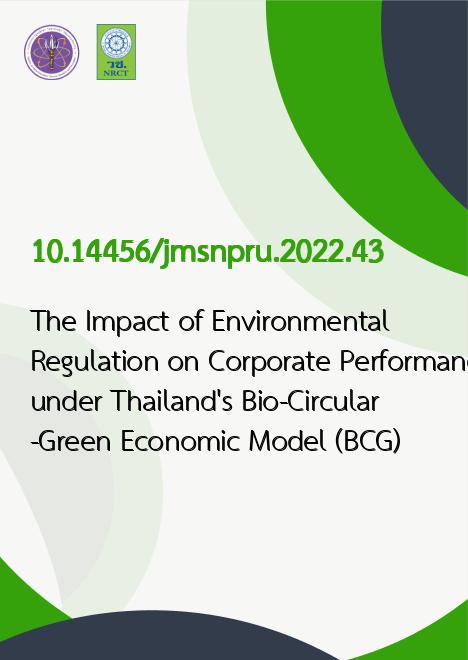
|
The Impact of Environmental Regulation on Corporate Performance under Thailand's Bio-Circular-Green Economic Model (BCG) |
|---|---|
| รหัสดีโอไอ | |
| Creator | Tang Haoxin |
| Title | The Impact of Environmental Regulation on Corporate Performance under Thailand's Bio-Circular-Green Economic Model (BCG) |
| Publisher | Faculty of Management Science Nakhon Pathom Rajabhat University. |
| Publication Year | 2565 |
| Journal Title | Journal of Management Science Nakhon Pathom Rajabhat University |
| Journal Vol. | 9 |
| Journal No. | 2 |
| Page no. | 174-196 |
| Keyword | Thailand BCG model, environmental regulation, competitive strategy, corporate performance |
| URL Website | https://so03.tci-thaijo.org/index.php/JMSNPRU/issue/view/17369 |
| Website title | https://so03.tci-thaijo.org/index.php/JMSNPRU/index |
| ISSN | 2392-5817 |
| Abstract | The research objectives of this study are: 1) The theoretical evolution process and research status of the impact of environmental regulation on corporate performance in Thailand's BCG model; 2) To build a theoretical model of environmental regulation, corporate competition strategy and corporate performance. 3) Verify the impact of environmental regulation on corporate performance from the perspective of corporate competitive strategy response; 4) Provide suggestions for Thailand to optimize the BCG model and help companies formulate competitive strategies to improve corporate performance. Ultimately, Thailand will achieve a "win-win" environment and economy, and the Thailand BCG model will be extended to more countries.The research shows that: 1) the command-and-control environmental regulation has no clear influence on the competitive advantage of enterprises; 2) the market-incentiveand voluntary environmental regulation has a significant positive impact on the enterprise's competitive advantage; 3) the market-incentive environmental regulation has a positive effect on the enterprise's competitive advantage The low-cost strategy has a significant positive impact, with a high impact factor of 70.4%. Voluntary environmental regulation has a significant positive impact on the differentiated competitive advantage of enterprises, with an impact factor of 48.8%; 5) No matter what kind of enterprise competitive advantage has a significant positive impact on enterprise performance, the impact factor is 56.2% and 52.8% respectively. Finally, based on the results of theoretical research and empirical analysis, this paper puts forward suggestions and countermeasures to improve environmental regulation policies and improve corporate competition strategies under the new BCG model from the two levels of national macro-control and enterprise operation, in order to optimize the BCG environment in Thailand. Regulatory policies and enterprises' implementation of competitive strategies to obtain financial performance point out the path, in order to provide a theoretical basis for optimizing Thailand's BCG environmental regulation policy and extending the Thai BCG model to more countries. |